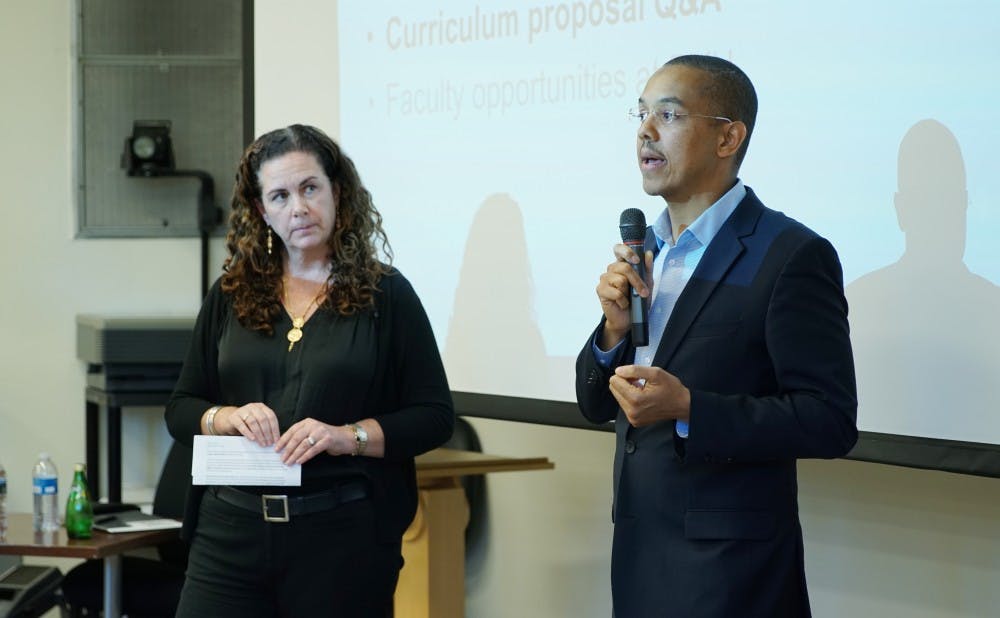Arts and Sciences Council met Thursday to discuss the latest version of the proposed curriculum.
The proposal, dubbed "Experience Duke Deliberately," currently calls for increasing the number of courses required for graduation and making up to six courses convertible to “credit/no credit.” When the first outline of the new curriculum was presented in January, the Arts and Sciences Council debated and provided feedback on the proposal. The curriculum committee recently introduced a revised draft, with a final version to be revealed in early 2017.
“I think that as we move forward with this curriculum, it is something we can all be proud of and excited about,” said Suzanne Shanahan, chair of the Imagining the Duke Curriculum Committee and an associate research professor of sociology. “This [process] is about ideas and feedback.”
Council members applauded the committee’s work. Alexander Rosenberg, the R. Taylor Cole professor of philosophy, emphasized that the new curriculum will serve as a recruitment tool for the University.
“Here, we produced an outcome that meets the most important test that we can assess a curriculum with, and that is 'does this curriculum attract the kind of students that we want to come to Duke?' The previous curriculum didn’t,” he said. “I believe that this curriculum will attract the kinds of students to apply to Duke that we want to accept our invitation to come.”
Frances Hasso, a council member and associate professor of gender, sexuality and feminist studies, had her students give feedback on the IDC’s proposal.
She told the council that the "mentored scholarly experience" and the secondary academic depth portions of the new curriculum were non-controversial and that the students appreciated the shift to requiring courses across five modes to be taken within the first two years. However, her students took issue with the proposed Duke Experience seminar, which would be a required, year-long "multi-disciplinary team taught" seminar for first-year students.
“They thought it was a terrible idea,” Hasso said. “They asked, ‘why would one want to be stuck with a professor and students for a whole year if the class doesn’t work out?’ It was really very interesting. People who have done FOCUS said that there is uneven quality in the courses and that there is not always a vibrant intellectual community, but at least you are in it for one semester.”
Several professors also took issue with increasing the number of courses required to graduate alongside the introduction of declaring up to six courses as “credit/no credit.” They worried that this will result in students not taking the classes as seriously if they intend to declare them as “credit/no credit."
Faculty also had a mixed reaction to the curriculum's shift away from counting AP credits.
“We are cheating them of an education by not giving them at least 36 classes, and I think one of the strengths of this proposal is an increase in the total burden of education that students have to bear," Rosenberg said.
The proposal allows departments to still use the classes to place students out of introduction classes.
Other professors expressed concern about the curriculum's abolition of the foreign language requirement.
Valerie Ashby, dean of Trinity College of Arts and Sciences, thanked the council for their engagement and feedback on the proposal.
“I’m so proud of the way that we are having these discussions,” she said. “I’m excited about where we are going. We are almost there.”
There will be several town hall discussions during the next several weeks for members of the Duke community to provide feedback on the revised draft.
The Arts and Sciences Council also heard a presentation from Haiyan Gao, the vice chancellor for academic affairs at Duke Kunshan University, and Henry Newsome, professor of physics, about the opportunities for faculty at DKU.
“We would really love to have you visit,” Gao said. “Assuming the undergraduate degree will be approved, we will be busy searching, and we would like to invite you to be involved by asking you to serve on the DKU faculty search committees.”
Get The Chronicle straight to your inbox
Signup for our weekly newsletter. Cancel at any time.
Bre is a senior political science major from South Carolina, and she is the current video editor, special projects editor and recruitment chair for The Chronicle. She is also an associate photography editor and an investigations editor. Previously, she was the editor-in-chief and local and national news department head.
Twitter: @brebradham
Email: breanna.bradham@duke.edu

